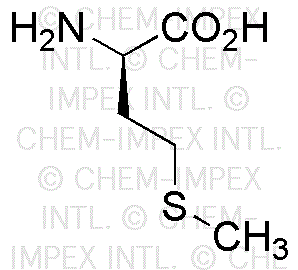D-Methionine is widely utilized in research focused on:
- Animal Nutrition: This amino acid is crucial in livestock and poultry feed, promoting growth and improving overall health. Its supplementation can lead to better feed efficiency and meat quality.
- Human Health Supplements: D-Methionine is often included in dietary supplements aimed at supporting liver function and detoxification processes, providing a natural way to enhance metabolic health.
- Pharmaceuticals: It plays a role in the development of drugs targeting liver diseases and conditions related to oxidative stress, showcasing its potential in therapeutic applications.
- Cosmetic Products: The compound is used in skincare formulations for its antioxidant properties, helping to protect skin cells from damage and promoting a youthful appearance.
- Research in Biochemistry: D-Methionine is a valuable tool in studies related to protein synthesis and enzyme function, aiding scientists in understanding metabolic pathways and cellular processes.
General Information
Properties
Safety and Regulations
Applications
D-Methionine is widely utilized in research focused on:
- Animal Nutrition: This amino acid is crucial in livestock and poultry feed, promoting growth and improving overall health. Its supplementation can lead to better feed efficiency and meat quality.
- Human Health Supplements: D-Methionine is often included in dietary supplements aimed at supporting liver function and detoxification processes, providing a natural way to enhance metabolic health.
- Pharmaceuticals: It plays a role in the development of drugs targeting liver diseases and conditions related to oxidative stress, showcasing its potential in therapeutic applications.
- Cosmetic Products: The compound is used in skincare formulations for its antioxidant properties, helping to protect skin cells from damage and promoting a youthful appearance.
- Research in Biochemistry: D-Methionine is a valuable tool in studies related to protein synthesis and enzyme function, aiding scientists in understanding metabolic pathways and cellular processes.
Documents
Safety Data Sheets (SDS)
The SDS provides comprehensive safety information on handling, storage, and disposal of the product.
Product Specification (PS)
The PS provides a comprehensive breakdown of the product’s properties, including chemical composition, physical state, purity, and storage requirements. It also details acceptable quality ranges and the product's intended applications.
Certificates of Analysis (COA)
Search for Certificates of Analysis (COA) by entering the products Lot Number. Lot and Batch Numbers can be found on a product’s label following the words ‘Lot’ or ‘Batch’.
*Catalog Number
*Lot Number
Certificates Of Origin (COO)
This COO confirms the country where the product was manufactured, and also details the materials and components used in it and whether it is derived from natural, synthetic, or other specific sources. This certificate may be required for customs, trade, and regulatory compliance.
*Catalog Number
*Lot Number
Safety Data Sheets (SDS)
The SDS provides comprehensive safety information on handling, storage, and disposal of the product.
DownloadProduct Specification (PS)
The PS provides a comprehensive breakdown of the product’s properties, including chemical composition, physical state, purity, and storage requirements. It also details acceptable quality ranges and the product's intended applications.
DownloadCertificates of Analysis (COA)
Search for Certificates of Analysis (COA) by entering the products Lot Number. Lot and Batch Numbers can be found on a product’s label following the words ‘Lot’ or ‘Batch’.
*Catalog Number
*Lot Number
Certificates Of Origin (COO)
This COO confirms the country where the product was manufactured, and also details the materials and components used in it and whether it is derived from natural, synthetic, or other specific sources. This certificate may be required for customs, trade, and regulatory compliance.


